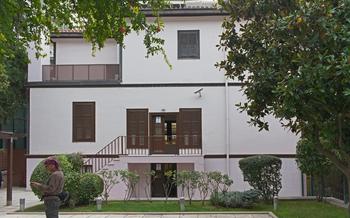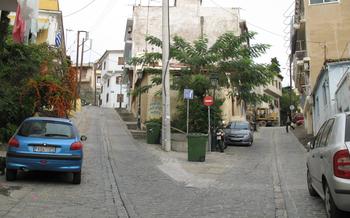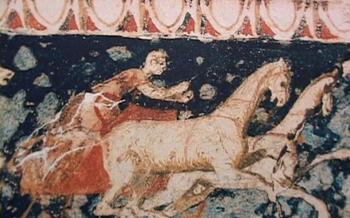
Museum for the Macedonian Struggle
- Historical Background:
- Location and Accessibility
- Museum Layout and Galleries
- Permanent Exhibitions
- Temporary Exhibitions
- Educational Programs and Workshops
- Research Facilities and Library
- Museum Shop and Souvenirs
- Admission Fees and Hours of Operation
- Accessibility for Visitors with Disabilities
- Photography and Videography Policy
- Food and Beverage Options
- Nearby Restaurants and Cafés
- Insider Tip:
Historical Background:
The history of the Macedonian Struggle is a complex and fascinating one, inextricably linked to Greece's quest for independence and territorial integrity. Beginning in the late 19th century, Greece found itself embroiled in a series of conflicts against neighboring countries, including the Ottoman Empire, Bulgaria, and Serbia, all vying for control of the strategically and culturally significant region of Macedonia.
The establishment of the Museum for the Macedonian Struggle in Thessaloniki serves as a testament to the significance of this period in Greek history. Dedicated to preserving the memory and legacy of the struggle, the museum offers a comprehensive exploration of the events, personalities, and sacrifices that shaped the course of Greece's modern history.
Location and Accessibility
The Museum for the Macedonian Struggle is conveniently located in the heart of Thessaloniki, at 23 Proxenou Koromila Street. It is easily accessible by public transportation, with several bus lines stopping nearby. Visitors can also reach the museum by car, as there is limited street parking available in the surrounding area.
This central location makes it easy to combine a visit to the museum with other attractions in Thessaloniki. The White Tower, a prominent landmark and symbol of the city, is just a short walk away. Visitors can also explore the vibrant Kapani Market, known for its colorful stalls selling fresh produce, spices, and traditional Greek products. Additionally, the museum is within walking distance of the waterfront promenade, where visitors can enjoy scenic views of the Thermaic Gulf and the city skyline.
Museum Layout and Galleries
The Museum for the Macedonian Struggle is housed in a beautifully restored neoclassical building, which adds to the overall ambiance and significance of the museum. The layout of the museum is well-organized, with different galleries dedicated to various aspects of the Macedonian Struggle. As you enter the museum, you'll find yourself in the main hall, which provides a brief overview of the struggle and its historical context.
The museum's permanent exhibitions are spread across several galleries, each focusing on specific themes or periods of the struggle. The galleries feature a rich collection of artifacts, documents, photographs, and multimedia presentations that bring the history of the Macedonian Struggle to life. Among the highlights are the gallery dedicated to the armed struggles, showcasing weapons, uniforms, and personal belongings of the fighters. Another gallery focuses on the role of women in the struggle, shedding light on their contributions and sacrifices. Visitors can also explore galleries dedicated to the diplomatic efforts, international involvement, and the aftermath of the struggle.
Permanent Exhibitions
The Museum for the Macedonian Struggle houses a series of permanent exhibitions that delve into the history, struggles, and triumphs of the Macedonian people. The central theme that runs through these exhibitions is the pursuit of autonomy and self-determination by the Macedonians against various occupying forces.
One of the key exhibits is a collection of artifacts, documents, and photographs that narrate the rise of the Macedonian national consciousness during the 19th century. Visitors can trace the evolution of Macedonian identity, the formation of revolutionary groups, and the struggle for independence from the Ottoman Empire.
Another highlight is the section dedicated to the Ilinden Uprising of 1903, a pivotal event in the Macedonian Struggle. Through interactive displays and multimedia presentations, visitors can learn about the uprising's planning, execution, and its impact on the Macedonian cause.
The permanent exhibitions also showcase the role of international diplomacy and foreign powers in the Macedonian Struggle. Visitors can explore the diplomatic efforts, alliances, and interventions that shaped the region's destiny, including the Balkan Wars and the Treaty of Bucharest.
The museum's permanent collection provides a comprehensive overview of the Macedonian Struggle, immersing visitors in the complexities of this historical period and its lasting impact on the region.
Temporary Exhibitions
In addition to its permanent exhibitions, the Museum for the Macedonian Struggle also hosts temporary exhibitions that explore various aspects of the Macedonian Struggle and its legacy. These exhibitions offer a fresh perspective on the conflict and provide visitors with an opportunity to learn more about its complexities and significance.
Temporary exhibitions often focus on specific themes, such as the role of women in the struggle, the impact of the conflict on the local population, or the international dimensions of the Macedonian Question. They may also showcase new research findings or feature artifacts and documents that are not part of the museum's permanent collection.
The museum's temporary exhibitions are typically displayed in a dedicated gallery space and are accompanied by informative panels and multimedia displays. They are designed to complement the permanent collection and offer visitors a more comprehensive understanding of the Macedonian Struggle.
Current and upcoming temporary exhibitions at the Museum for the Macedonian Struggle can be found on the museum's website or by inquiring at the museum's information desk.
Educational Programs and Workshops
The Museum for the Macedonian Struggle recognizes the importance of education and outreach, offering a range of educational programs and workshops to engage visitors of all ages. These programs aim to deepen the understanding of the Macedonian Struggle and its historical significance.
One of the most popular educational programs is the guided tour. Led by knowledgeable museum educators, these tours provide a comprehensive overview of the museum's exhibits and artifacts. Visitors can learn about the key events of the struggle, the people who fought for Macedonia's freedom, and the lasting impact of their sacrifices.
For students and researchers, the museum offers specialized workshops that explore specific aspects of the Macedonian Struggle in greater depth. These workshops often feature guest speakers, interactive activities, and hands-on learning experiences. Participants can engage in discussions, analyze primary sources, and gain a deeper understanding of the historical context and complexities of the struggle.
The museum also caters to younger visitors with educational programs designed specifically for children and families. These programs use storytelling, games, and hands-on activities to make learning about the Macedonian Struggle fun and engaging for kids. Through these initiatives, the museum strives to inspire the next generation to learn from the past and contribute to a more peaceful and just future.
Research Facilities and Library
The Museum for the Macedonian Struggle acknowledges the significance of research and scholarship in preserving and disseminating knowledge about the Macedonian Struggle. To this end, it houses a well-equipped research facility and library that is open to the public. The facility provides scholars, researchers, and students with access to a wealth of resources related to the struggle.
The library holds an extensive collection of books, periodicals, and documents on the history, politics, and culture of Macedonia during the period of the struggle. These resources include rare and out-of-print publications, as well as contemporary works by renowned scholars. The library also houses a collection of personal papers, letters, and memoirs of individuals who played a role in the struggle, offering valuable insights into their experiences and perspectives.
Researchers and scholars can access the library's collection by appointment. The museum's staff is available to assist researchers in their inquiries and provide guidance on navigating the collection. The research facility also offers photocopying and scanning services, enabling researchers to make copies of documents for their research.
Through its research facilities and library, the Museum for the Macedonian Struggle fosters a vibrant scholarly community and contributes to the advancement of knowledge about this pivotal period in Greek history.
Museum Shop and Souvenirs
The Museum for the Macedonian Struggle features a well-stocked museum shop where visitors can purchase a variety of souvenirs and merchandise related to the history and culture of the region. From traditional handicrafts to replicas of ancient artifacts, the shop offers a unique selection of items that serve as both mementos of your visit and educational tools for further exploration.
One of the highlights of the museum shop is its collection of books and publications. Here, visitors can find a wealth of literature on the Macedonian Struggle, including historical accounts, biographies, and personal narratives. These books provide a deeper understanding of the events and personalities that shaped this pivotal period in Greek history.
For those seeking a more tangible reminder of their visit, the shop offers a variety of souvenirs, such as postcards, magnets, and keychains featuring images of the museum's exhibits and artifacts. There are also replicas of ancient coins, pottery, and jewelry, allowing visitors to take home a piece of history that they can cherish for years to come.
The museum shop also supports local artisans by showcasing their unique creations inspired by the Macedonian Struggle. These handcrafted items, such as woven textiles, pottery, and jewelry, not only make for beautiful souvenirs but also contribute to the preservation of traditional skills and techniques.
By making a purchase at the museum shop, visitors not only support the museum's mission to preserve and promote the memory of the Macedonian Struggle but also contribute to the local economy and community.
Admission Fees and Hours of Operation
Admission Fees:
- Adults: 6 euros
- Students: 3 euros
- Children under 12: Free admission
Discounts:
- Seniors (65+ years): 50% discount
- Groups of 10 or more: 10% discount
- School groups: Free admission with advance booking
Hours of Operation:
- Summer (April-October):
- Tuesday-Sunday: 8:00 am - 8:00 pm
- Monday: Closed
- Winter (November-March):
- Tuesday-Sunday: 8:00 am - 3:00 pm
- Monday: Closed
Note: The museum is closed on public holidays.
Accessibility for Visitors with Disabilities
The Museum for the Macedonian Struggle is committed to providing an inclusive and accessible experience for all visitors, regardless of their physical abilities. The museum is fully wheelchair accessible, with ramps and elevators connecting all levels of the building. Wheelchair-accessible restrooms are also available on each floor.
In addition, the museum offers a variety of assistive devices and services for visitors with disabilities. These include audio guides with closed captions, magnifying glasses, and Braille signage. Visitors who require assistance can also request a personal assistant from the museum staff.
The museum's staff is dedicated to ensuring that all visitors have a positive and enjoyable experience. If you have any questions or concerns about accessibility, please do not hesitate to contact the museum in advance of your visit. They will be happy to assist you in any way they can.
Photography and Videography Policy
When it comes to capturing memories of your visit, the Museum for the Macedonian Struggle has a clear policy regarding photography and videography. Visitors are permitted to take photographs and videos for personal, non-commercial use only. However, the use of tripods, flash photography, or any other professional photography equipment is strictly prohibited within the museum galleries. This policy is in place to ensure that all visitors have an enjoyable and distraction-free experience while exploring the exhibits. By respecting these guidelines, you can help preserve the integrity of the museum's collection and allow others to appreciate the artifacts without disruption.
Food and Beverage Options
Unfortunately, the Museum for the Macedonian Struggle does not have a café or restaurant on-site where visitors can purchase food and beverages. However, the museum is conveniently located in the city center, surrounded by a variety of dining options to suit every taste and budget.
For a quick bite or a refreshing drink, visitors can head to one of the many cafés and coffee shops in the surrounding streets. If you're looking for a more substantial meal, there are several restaurants nearby offering traditional Greek cuisine, international fare, and vegetarian-friendly options.
To make the most of your visit, consider exploring the culinary delights of Thessaloniki before or after your museum experience. The city is renowned for its vibrant food scene, with a diverse range of restaurants, tavernas, and street food vendors serving up everything from fresh seafood to mouthwatering pastries.
Nearby Restaurants and Cafés
After immersing yourself in the history of the Macedonian Struggle, you might want to grab a bite to eat or enjoy a refreshing beverage. Fortunately, there are several excellent restaurants and cafés located within walking distance of the museum.
For a taste of traditional Greek cuisine, head to To Patriko Mas on Vasileos Irakleiou Street. This family-run tavern serves up delicious dishes like moussaka, pastitsio, and grilled meats. The atmosphere is warm and welcoming, and the prices are very reasonable.
If you're looking for something a little more modern, try The Food Project on Tsimiski Street. This stylish restaurant offers a creative menu that changes seasonally, featuring dishes made with fresh, local ingredients. The cocktails are also top-notch, and the rooftop terrace provides stunning views of the city.
For a quick and casual meal, Falafellas on Mitropoleos Street is a great option. This popular spot serves up delicious falafel sandwiches, wraps, and platters, all made with fresh, homemade ingredients. The falafel is crispy on the outside and fluffy on the inside, and the tahini sauce is divine.
And if you're in the mood for a sweet treat, don't miss Loukoumades Tis Lelas on Aristotelous Square. This traditional Greek pastry shop specializes in loukoumades, which are fried dough balls served with honey and cinnamon. They're the perfect way to end a day of exploring Thessaloniki.
Insider Tip:
While exploring the museum, take a moment to visit the outdoor courtyard, where you'll find a monument dedicated to the fallen heroes of the Macedonian Struggle. The monument, surrounded by lush greenery, offers a serene and reflective space to contemplate the sacrifices made during this pivotal period in Greek history. Remember to capture this poignant tribute in your photographs as a lasting reminder of your visit to the Museum for the Macedonian Struggle.



